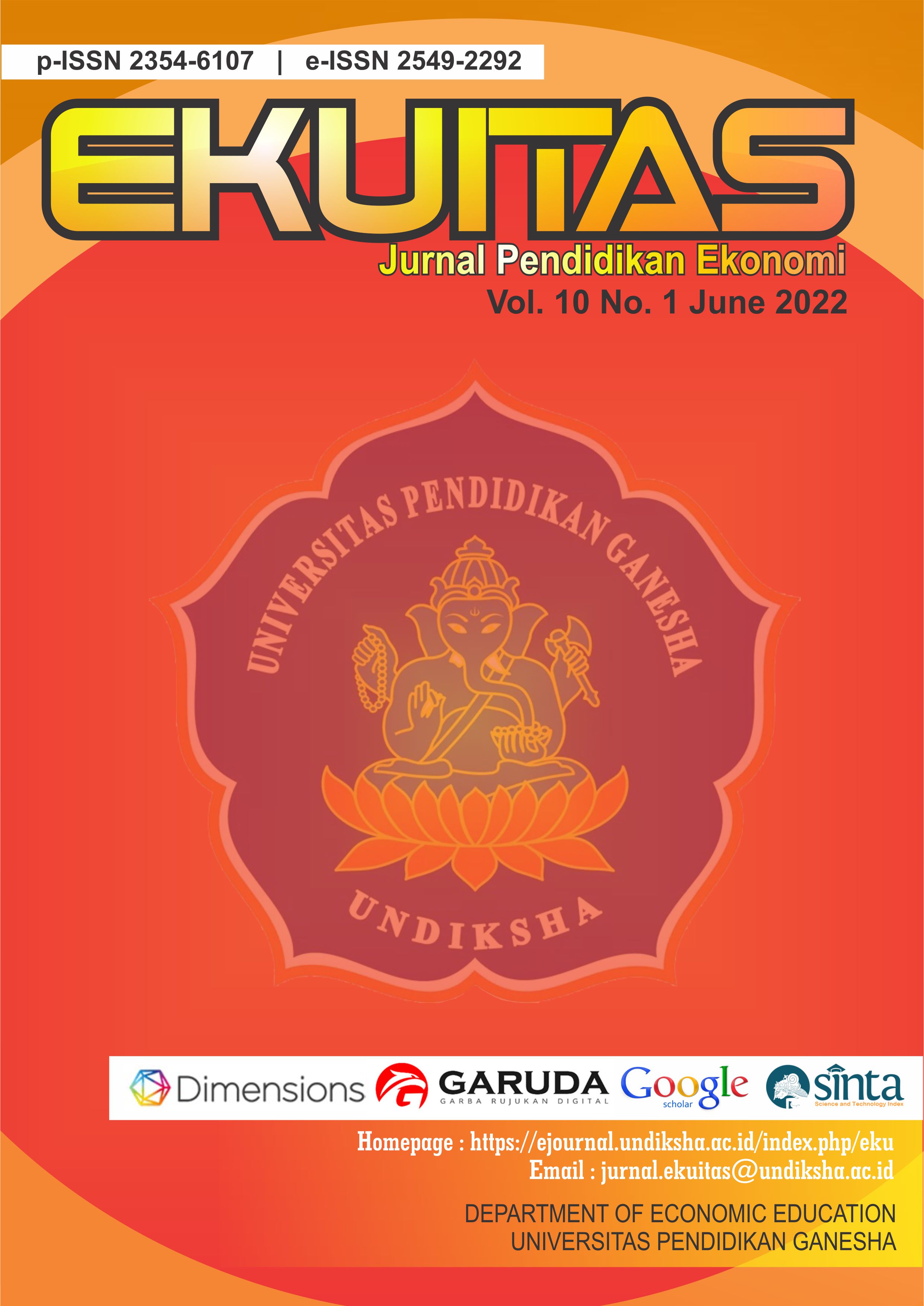Kompensasi Sebagai Suatu Upaya dalam Memotivasi Karyawan di Universitas 17 Agustus 1945 Banyuwangi
DOI:
https://doi.org/10.23887/ekuitas.v10i1.46779Kata Kunci:
Compensation, motivation, performanceAbstrak
University of 17 August 1945 Banyuwangi is one of the universities in Banyuwangi Regency. Being a private university, of course, makes the University of 17 August 1945 Banyuwangi to be maximal in providing services to its students. The services provided by the campus certainly do not only refer to the classroom learning provided by the lecturers, but also from the employees who work on campus. In order for employees to be maximal in providing services to students, of course,the first these employees must be prosperous from the economic side. Based on this, the authors are interested in researching more deeply about how the role of compensation applied by the campus can motivate its employees. This research was conducted using a qualitative approach with interviews as the basis for data collection. Informants in this research amounted to 5 people who have more than 10 years of work experience and are at the level of officials and staff. Based on the results of the research and discussion, it is found that the fair principle and the fair and reasonable principle applied in the compensation system are able to motivate employees at work. The fair principle applied is reflected through the provision of compensation in accordance with the workload and position of the employee. Then, the principle of worth is felt by employees through the opportunity to get a comfortable and calm life because they are able to meet the needs of life in Banyuwangi properly and fairly.
Referensi
Adha, R. N., Qomariah, N., & Hafidzi, A. H. (2019). Pengaruh Motivasi Kerja, Lingkungan Kerja, Budaya Kerja Terhadap Kinerja Karyawan Dinas Sosial Kabupaten Jember. Jurnal Penelitian IPTEKS, 4(1), 47. https://doi.org/10.32528/ipteks.v4i1.2109
Ardhani, J., & Ratnasari, S. L. (2019). Pengaruh Motivasi Kerja Terhadap Kinerja Pegawai Pt. Pln Batam. Jurnal Dimensi, 8(2), 27–41. https://doi.org/10.33373/dms.v8i2.2179
Dr. Siti, M. P. . M. (2019). Perpustakaan Nasional Republik Indonesia Katalog Dalam Terbitan ( Kdt ) , Manajemen Kompensasi.
Isvandiari, A., & Fuadah, L. (2017). Pengaruh Kompensasi dan Disiplin Kerja Terhadap Kinerja Karyawan Bagian Produksi PG. Meritjan Kediri. Jurnal Ilmiah Bisnis Dan Ekonomi Asia, 11(2), 1–8. https://doi.org/10.32812/jibeka.v11i2.54
KENELAK, D., PIO, R., & KAPARANG, S. (2016). Manajemen Sumber Daya Manusia. Jurnal Administrasi Bisnis (Jab), 4(4), 1–10.
Moleong, L. J. (2007). Metodologi Penelitian Kualitatif. Bandung: PT. Remaja Rordakarya.
Mubaroq, R. A., & Zulkarnaen, W. (2017). Pengaruh Kompensasi Terhadap Motivasi Kerja Karyawanpada Shadiq Sharia Ex. BPRS Cipaganti Bandung. Jurnal Ilmiah Mea, 1(3), 72–89.
Rosanto, J. S. dan O. (2019). Pengaruh Kompensasi Terhadap Kinerja Karyawan Pada Pt. Asuransi Bangun Askrida Cabang Jakarta. Jesya (Jurnal Ekonomi & Ekonomi Syariah), 2(2), 209–223.
Simamora, H. (2010). Manajemen Sumber Daya Manusia. Jakarta: PT. Remaja Rordakarya.
Sugiyono. (2018). Metode Penelitian Pendidikan Pendekatan Kuantitatif, kualitatif, dan R&D. Bandung: Alfabeta.
Widoyoko, E. P. (2014). Teknik Instrumen Penelitian. Yogyakarta: Pustaka Pelajar.
Yusuf, T. (2019). Pengaruh Kompensasi dan Motivasi terhadap Kinerja Pegawai pada Badan Kepegawaian Pendidikan dan Pelatihan Daerah Kabupaten Lampung Timur. Jurnal Simplex, 2(2), 58–68.
Unduhan
Diterbitkan
Terbitan
Bagian
Lisensi
Hak Cipta (c) 2022 Ekuitas: Jurnal Pendidikan Ekonomi

Artikel ini berlisensiCreative Commons Attribution-ShareAlike 4.0 International License.








